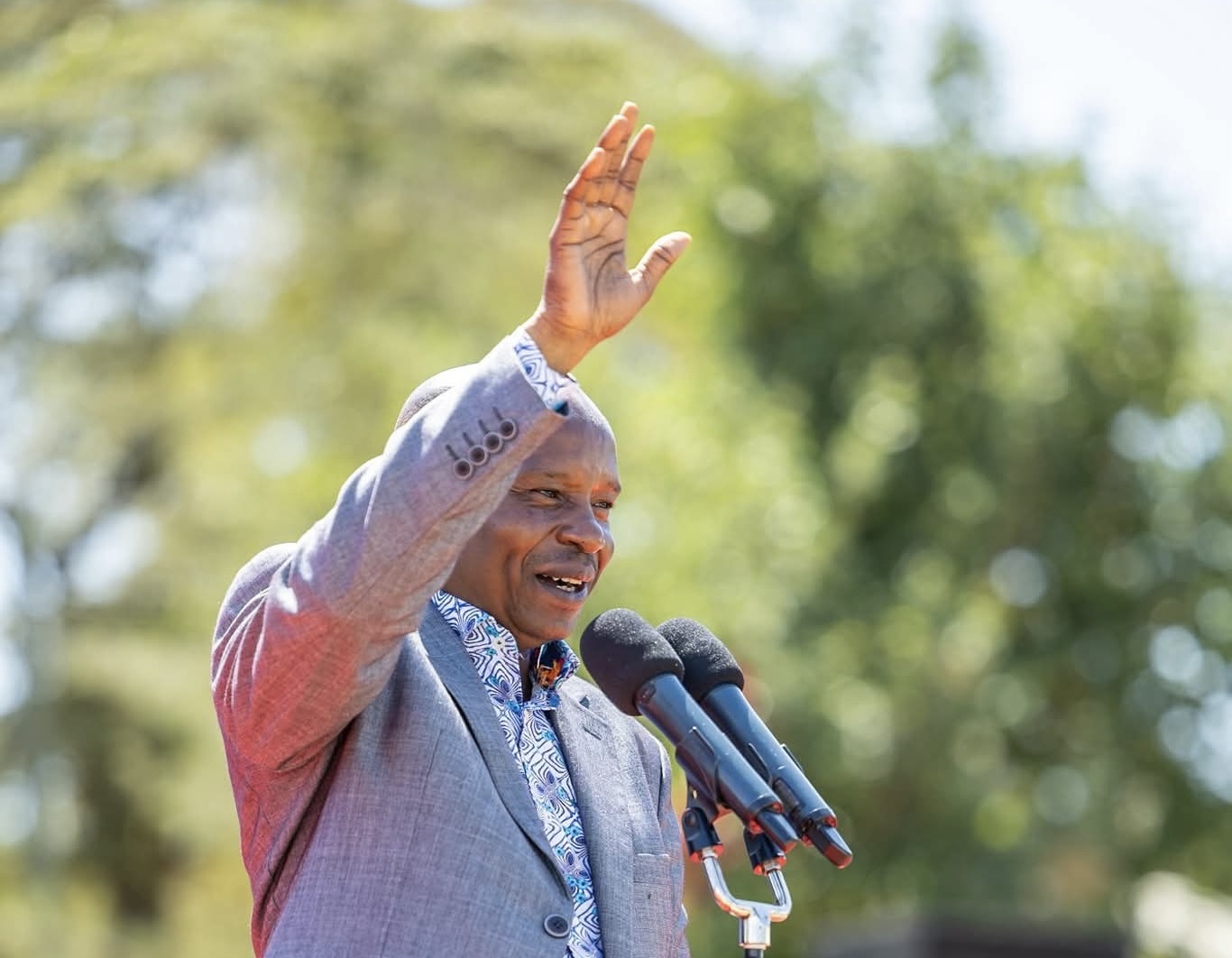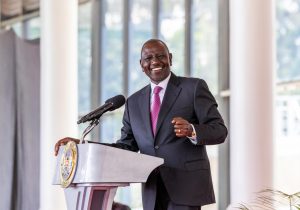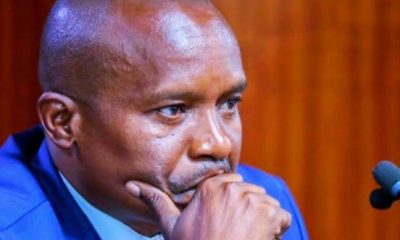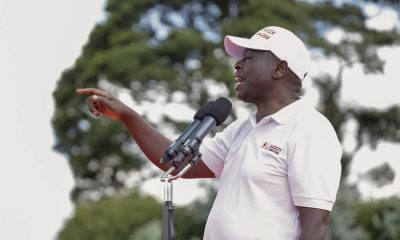Politics
Government Extravagance: DP Kindiki Splashing Sh100M Weekly As He Seeks Relevance
The Deputy President’s predictable formula has become a spectacle: he personally contributes Sh2 million at each event while presenting an additional Sh3 million from President William Ruto.

Deputy President Kithure Kindiki’s relentless countrywide cash distribution tours are raising serious questions about government spending priorities and accountability as Kenya grapples with economic challenges
Deputy President Kithure Kindiki has transformed into Kenya’s biggest political spender, orchestrating a massive cash distribution operation that sees his team splash nearly Sh100 million weekly across the country in what critics describe as desperate attempts to buy political relevance and shore up support for the struggling Kenya Kwanza administration.
The money trail
In just one week, Kindiki has led 10 economic empowerment events, with his latest appearances in Machakos and Nyamira counties on Friday alone raising Sh20 million.
The Deputy President’s predictable formula has become a spectacle: he personally contributes Sh2 million at each event while presenting an additional Sh3 million from President William Ruto.
“Nimeleta mchango wangu wa shilingi milioni 2 na milioni 3 ya Rais” (I have brought my contribution of 2 million shillings and 3 million from the President), has become Kindiki’s signature line as he crisscrosses the country with bags full of cash.
The spending pattern reveals a systematic hierarchy of contributions that appears choreographed to demonstrate government largesse.
Investigation shows that the President leads with Sh3 million at almost every event, while his deputy delivers Sh2 million.
Parliament Speaker and Majority Leaders contribute at least Sh1 million per event, MPs fork out Sh100,000, and MCAs contribute Sh20,000.
Questionable mathematics
These astronomical contributions starkly contrast with the officials’ official salaries as set by the Salaries and Remuneration Commission.
President Ruto earns Sh1.4 million monthly, Kindiki receives Sh1.2 million, while MPs earn Sh784,000 and MCAs Sh154,000.
The mathematical impossibility of sustaining such donations from official salaries alone has sparked intense debate about the source of these funds.
The Deputy President, who has earned the moniker “Mr. Money Bags,” splashes at least Sh5 million every time he steps out for an empowerment programme, with his team collectively contributing close to Sh100 million weekly.
This expenditure dwarfs most counties’ development budgets and raises fundamental questions about government priorities.
Corruption allegations
Former Deputy President Rigathi Gachagua, who was impeached and replaced by Kindiki, has emerged as the harshest critic of these spending sprees.
Speaking at a recent rally, Gachagua directly accused his successor of using public funds for political bribery.
“Ule Mr. Yes analeta pesa ya kuhonga nyinyi. Hiyo pesa mkule, hatuwezi zika ndovu na pembe” (That Mr. Yes is bringing money to bribe you. Eat that money, we cannot bury an elephant with its tusks), Gachagua declared, suggesting the funds are sourced from public coffers.
Kindiki has defended the programme, retorting: “Mimi nimekuja kuwahonga kweli? Hii ni pesa ya kusaidia wananchi” (Have I really come to bribe you? This is money to help citizens).
The exchange highlights the intensifying political battle between the two deputy presidents, with Gachagua positioning himself as a corruption fighter while Kindiki attempts to consolidate support through financial incentives.
Replacing banned harambees
These empowerment events appear designed to circumvent President Ruto’s ban on public harambees imposed a year ago.
While traditional fundraising was prohibited, these government-sponsored cash distributions have emerged as a more direct method of political patronage, eliminating the transparency that public harambees typically required.
The timing and geographical focus of these events, particularly in the Mt. Kenya region where Kenya Kwanza faces declining support, suggests a calculated political strategy rather than genuine development initiatives.
The lavish spending occurs against a backdrop of widespread economic hardship, with Kenyans struggling under heavy taxation, high cost of living, and reduced public services.
Critics argue that the government is engaging in “tokenism politics” – offering cash handouts instead of implementing sustainable economic policies.
Opposition voices have condemned the programme as a conduit for corruption, questioning not only the source of funds but also the lack of accountability mechanisms.
The Kenya Kwanza administration has been accused of prioritizing political survival over genuine economic development.
Government’s defense
Despite mounting criticism, the government has promised to continue and even expand the empowerment projects.
Kindiki has stated his intention to take the contributions “a notch higher,” suggesting even more extensive spending in the coming months.
Government officials defend the programme as supporting small and medium enterprises, with Kindiki claiming the administration has committed Sh28 billion to support SMEs through Sh50,000 grants.
However, critics argue that the high-profile cash distributions serve more political than economic purposes.
The programme raises serious constitutional questions about the separation of public and political funds.
With no clear audit trail or oversight mechanism, opposition leaders argue that taxpayers’ money is being used for political campaigns in violation of electoral laws and public finance management principles.
Legal experts have questioned whether such systematic cash distributions, particularly in regions where government support is waning, constitute vote-buying or abuse of office. The lack of transparency regarding fund sources only deepens these concerns.
As Kindiki promises to accelerate the programme with “faster, faster” implementation, the sustainability and legality of these spending sprees remain questionable.
With general elections still two years away, the current spending rate would require over Sh10 billion annually – funds that could alternatively address Kenya’s infrastructure, healthcare, and education challenges.
The Deputy President’s transformation into Kenya’s biggest political spender reflects a government under pressure, using financial inducements to maintain relevance in the face of growing public dissatisfaction.
Whether this strategy will secure long-term political support or simply drain public resources remains to be seen.
What is clear is that Kindiki’s Sh100 million weekly spending spree represents a new form of political extravagance that prioritizes short-term political gains over sustainable development, raising fundamental questions about governance, accountability, and the responsible use of public resources in contemporary Kenya.
Kenya Insights allows guest blogging, if you want to be published on Kenya’s most authoritative and accurate blog, have an expose, news TIPS, story angles, human interest stories, drop us an email on [email protected] or via Telegram
-

 Grapevine2 weeks ago
Grapevine2 weeks agoRussian Man’s Secret Sex Recordings Ignite Fury as Questions Mount Over Consent and Easy Pick-Ups in Nairobi
-

 News7 days ago
News7 days agoTHE FIRM IN THE DOCK: How Kaplan and Stratton Became the Most Scrutinised Law Firm in Kenya
-

 Investigations1 week ago
Investigations1 week agoMulti-Million Dollar Fraud: Three Kenyans Face US Extradition in Massive Cybercrime Conspiracy
-

 Economy1 week ago
Economy1 week agoIran Demands Arrest, Prosecution Of Kenya’s Cup of Joe Director Director Over Sh2.6 Billion Tea Fraud
-

 Business1 week ago
Business1 week agoA Farm in Kenya’s Rift Valley Ignites a National Reckoning With Israeli Investment
-

 Africa2 weeks ago
Africa2 weeks agoFBI Investigates Congresswoman Ilhan Omar’s Husband’s Sh3.8 Billion Businesses in Kenya, Somalia and Dubai
-

 Grapevine3 days ago
Grapevine3 days agoA UN Director Based in Nairobi Was Deep in an Intimate Friendship With Epstein — He Even Sent Her a Sex Toy
-

 Politics2 weeks ago
Politics2 weeks agoSifuna, Babu Owino Are Uhuru’s Project, Orengo Is Opportunist, Inconsequential in Kenyan Politics, Miguna Says
























